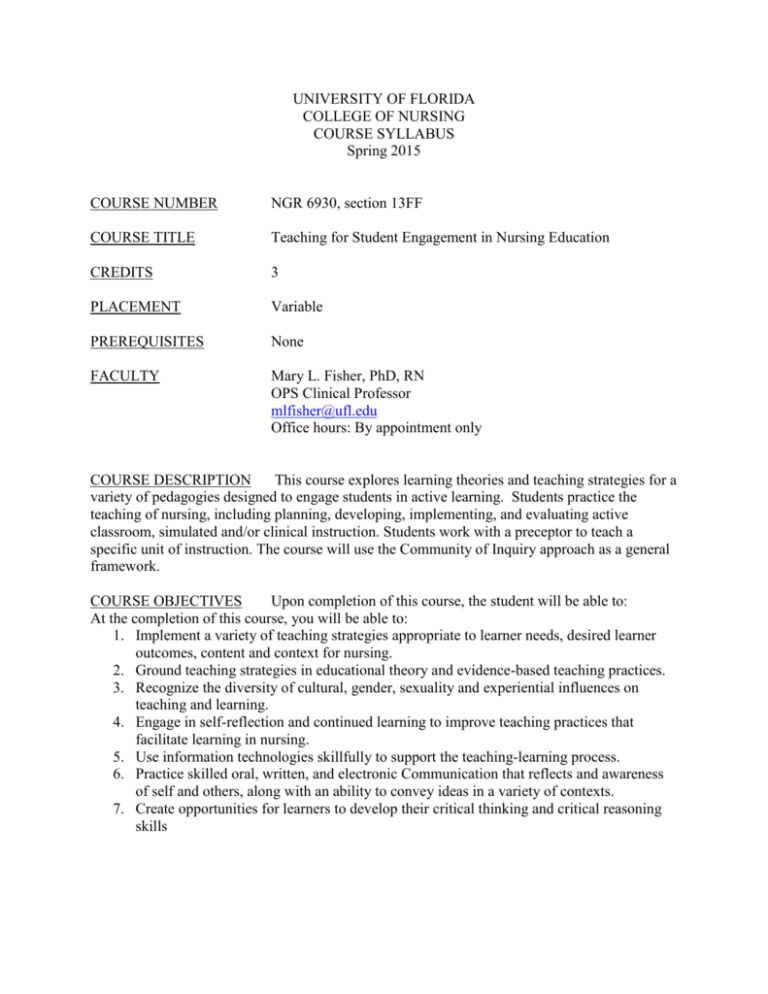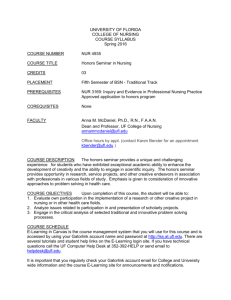UNIVERSITY OF FLORIDA COLLEGE OF NURSING COURSE
advertisement

UNIVERSITY OF FLORIDA COLLEGE OF NURSING COURSE SYLLABUS Spring 2015 COURSE NUMBER NGR 6930, section 13FF COURSE TITLE Teaching for Student Engagement in Nursing Education CREDITS 3 PLACEMENT Variable PREREQUISITES None FACULTY Mary L. Fisher, PhD, RN OPS Clinical Professor mlfisher@ufl.edu Office hours: By appointment only COURSE DESCRIPTION This course explores learning theories and teaching strategies for a variety of pedagogies designed to engage students in active learning. Students practice the teaching of nursing, including planning, developing, implementing, and evaluating active classroom, simulated and/or clinical instruction. Students work with a preceptor to teach a specific unit of instruction. The course will use the Community of Inquiry approach as a general framework. COURSE OBJECTIVES Upon completion of this course, the student will be able to: At the completion of this course, you will be able to: 1. Implement a variety of teaching strategies appropriate to learner needs, desired learner outcomes, content and context for nursing. 2. Ground teaching strategies in educational theory and evidence-based teaching practices. 3. Recognize the diversity of cultural, gender, sexuality and experiential influences on teaching and learning. 4. Engage in self-reflection and continued learning to improve teaching practices that facilitate learning in nursing. 5. Use information technologies skillfully to support the teaching-learning process. 6. Practice skilled oral, written, and electronic Communication that reflects and awareness of self and others, along with an ability to convey ideas in a variety of contexts. 7. Create opportunities for learners to develop their critical thinking and critical reasoning skills COURSE SCHEDULE E-Learning in Canvas is the course management system that you will use for this course. E-Learning in Canvas is accessed by using your Gatorlink account name and password at https://lss.at.ufl.edu/. There are several tutorials and student help links on the E-Learning login site. If you have technical questions call the UF Computer Help Desk at 352-392-HELP or send email to helpdesk@ufl.edu. It is important that you regularly check your Gatorlink account email for College and University wide information and the course E-Learning site for announcements and notifications. Course websites are generally made available on the Friday before the first day of classes. TOPICAL OUTLINE 1. Community of Inquiry Framework – collaborative knowledge construction 2. Student engagement strategies 3. Grounding teaching to learning theories 4. Evidence-based teaching approaches 5. Unique learning needs of diverse learners 6. Preparing a unit of instruction focused on student engagement 7. Evaluation strategies to improve teaching effectiveness TEACHING METHODS Online active learning modules, community of scholars group assignments, YouTube videos, individual student teaching experience and final examination. LEARNING ACTIVITIES Group discussions, case presentations, written papers, evaluation of teaching materials, research critiques, and selected readings EVALUATION METHODS/COURSE GRADE CALCULATION Community of Scholars group project Lesson plan and presentation SOTL Critiques (2 – 8 points each) Module assignments (6 – 4 points each) Teaching reflection paper 25% 25% 16% 24% 10% 100% MAKE UP POLICY Requirements for class attendance and make-up exams, assignments, and other work are consistent with university policies that can be found at: https://catalog.ufl.edu. Unexcused late work is penalized at -1point/day. GRADING SCALE/QUALITY POINTS A 95-100 (4.0) C 74-79* (2.0) A93-94 (3.67) C72-73 (1.67) B+ 91- 92 (3.33) D+ 70-71 (1.33) B 84-90 (3.0) D 64-69 (1.0) B82-83 (2.67) D62-63 (0.67) C+ 80-81 (2.33) E 61 or below (0.0) * 74 is the minimal passing grade For more information on grades and grading policies, please refer to University’s grading policies: https://catalog.ufl.edu/ugrad/current/regulations/info/grades.aspx REQUIRED TEXTBOOKS Billings, D. & Halstead, J. (2011). Teaching in nursing: A guide for faculty. (4th ed.). USA: Saunders. National League for Nursing. (2012). The scope of practice for academic nurse educators. Washington, D.C. ISBN13 # 9781934758175. Halstead, J. (2007). Nurse educator competencies: Creating an evidence-based practice for nurse educators. Washington, D.C. ISBN13 # 9781934758380. RECOMMENDED TEXTBOOK Barkley, E.F. (2010). Student Engagement Techniques: A handbook for College Faculty. San Francisco, CA: Jossey-Bass. UNIVERSITY AND COLLEGE OF NURSING POLICIES: Please see the College of Nursing website for a full explanation of each of the following policies - http://nursing.ufl.edu/students/student-policies-and-handbooks/course-policies/. Attendance Academic Honesty UF Grading Policy Accommodations due to Disability Religious Holidays Counseling and Mental Health Services Student Handbook Faculty Evaluations Student Use of Social Media WEEKLY CLASS SCHEDULE DATE Week 1 TOPIC/EVALUATION Community of Inquiry Week 2 Scope of Practice for Academic Nurse Educators Nurse Educator Core Competencies Student engagement strategies Week 3 Week 4 Week 5 Fostering critical thinking Week 6 Grounding teaching to learning theories Unique learning needs of diverse learners Evidence-based teaching approaches (continued) Preparing a unit of instruction focused on student engagement (continued) Week 7 Week 8 Week 9 Week 10 Week 11 ASSIGNMENTS/READINGS Shea, P & Bidjerano, T (2009). Community of Inquiry as a theoretical framework to foster “epistemic engagement” and “cognitive presence” in online education, Computers and Education, 52, 543-553. Introductions: either post a 1-3 minute video introducing yourself to the Introduction discussion forum, or a one-page summary of your summary. Please include 3 SMART personal objectives that you have for this course. (Specific, Measurable, Attainable, Realistic, Timely) NLN. (2012). Module 1 due Halstead Ch. 1, Halstead, Ch. 2, 3; Billings and Halstead, Ch. 10, 12, 20-23. SOTL Research Article # 1critique due Search YouTube for a video on student engagement and view it. Post a summary of what you learned in the video either by a 2-minute Prezi presentation or in a written summary. Billings and Halstead, Ch. 15 Module 2 due Billings and Halstead, Ch. 2, 4 Halstead, Ch. 10 Module 3 due SOTL Research Article # 2 critique due Module 4 due Week 12 Week 13 Week 14 Finals Evaluation strategies to improve teaching effectiveness Reflecting on your teaching practice Halstead, Ch. 4, 5, 7; Billings and Halstead, Ch. 16 Module 5 due Lesson plan and presentation due. Halstead, Ch. 8 Module 6 due Community of Inquiry presentations Teaching reflection paper due *This course has been designed to reflect competencies outlined in The Scope of Practice for Academic Nurse Educators (National League for Nursing, 2012).







